2022 ICNC Participant-Led Online Course Assessment
ICNC offered the participant-led online course “Civil Resistance Struggles: How Ordinary People Win Rights, Freedom, and Justice“ which took place from April 20 to June 10, 2022. This was the fourth year that ICNC has run this course.
Read more about the 2021 course and assessments below.
You can also view assessments from previous courses in 2021, 2020, 2019, 2018 and 2016-17.
Applications, Admission and Course Participants
In 2021, ICNC received 71 applications for the People Power online course. The quality of applications was high and it took several rounds of reviews to select the 50 participants who were invited to take part in the online course.
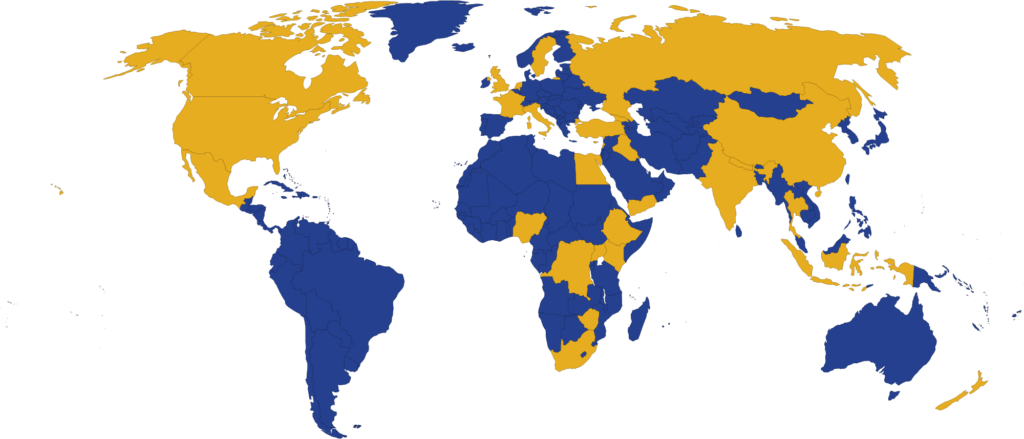
The 50 accepted applicants came from a wide range of backgrounds and countries, as shown in the graphs below. The largest number of participants came from Sub-Saharan Africa with 16, Europe with 10, The Americas with 9 applicants, 7 applicants from the Middle East. East and Southeast Asia had 4 participants combined. Central and South Asia had 3 participants combined. Lastly, 1 applicant came from Oceania. Below is a visual breakdown per region.
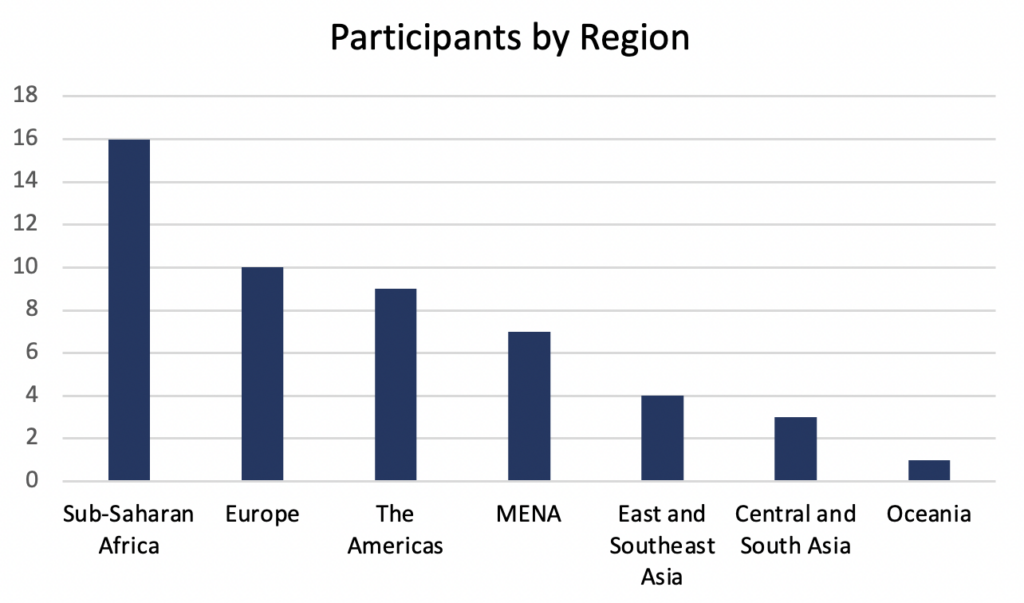
The accepted participants also came from a diverse range of professional backgrounds. The majority of participants had a background in activist/movement building, followed closely by a background in research and academia, and then by a background in internationally focused NGOs. Participants could choose more than one answer when selecting their background.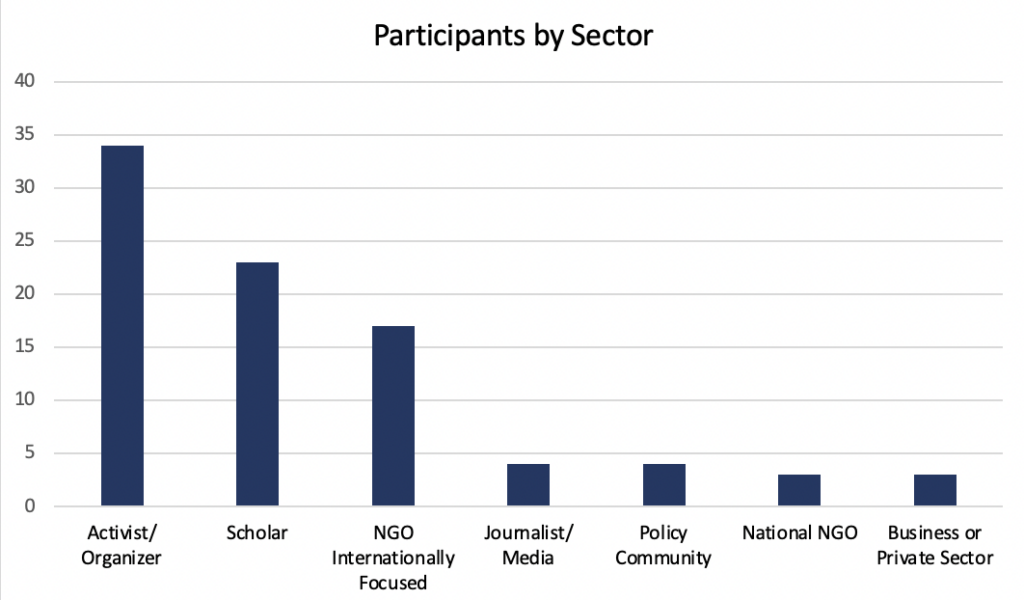
Before the course began, ICNC hosted two orientation webinars for course participants. A total of 50 participants attended the webinars. Each orientation webinar contained survey questions asking about the participant’s experience and what they hoped to gain from the course. In summary, the majority of participants indicated that they had organized or spoke/taught about CR in a public forum. The were excited about gaining theoretical knowledge about CR campaigns and gaining insights from other nonviolent campaigns. Participants wanted to listen with curiosity and share their on-the-ground experience with other learners. The participants also wanted to take their learnings from the course to organize CR campaigns and in training and coaching. Below are the results from the two sessions’ surveys combined.
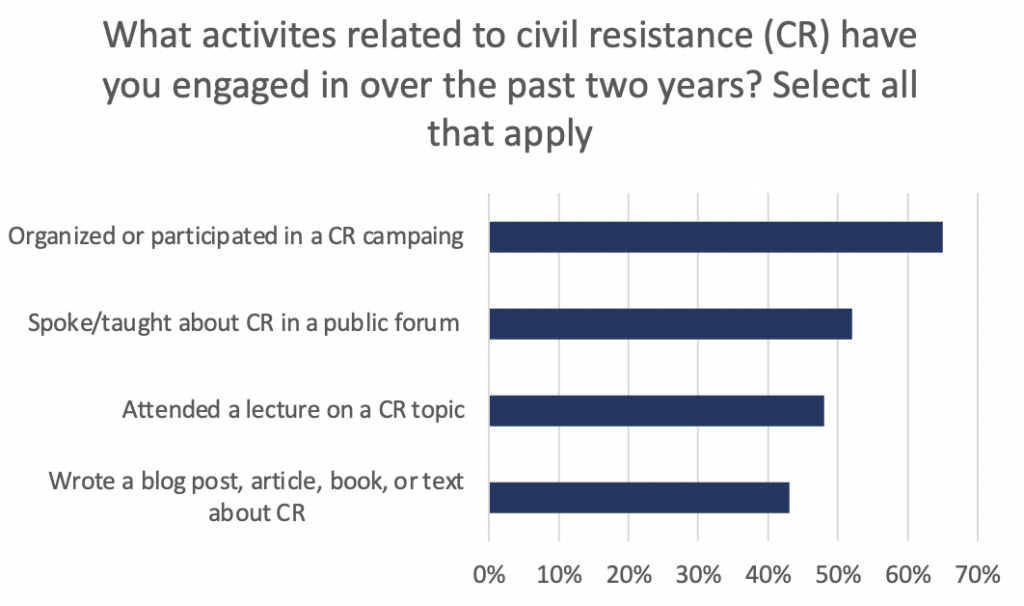
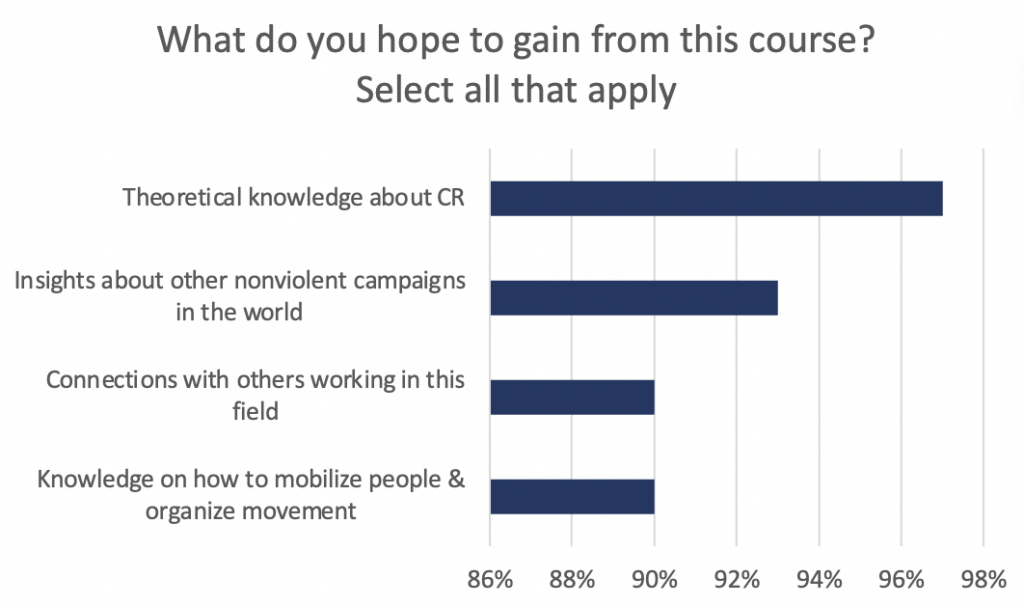
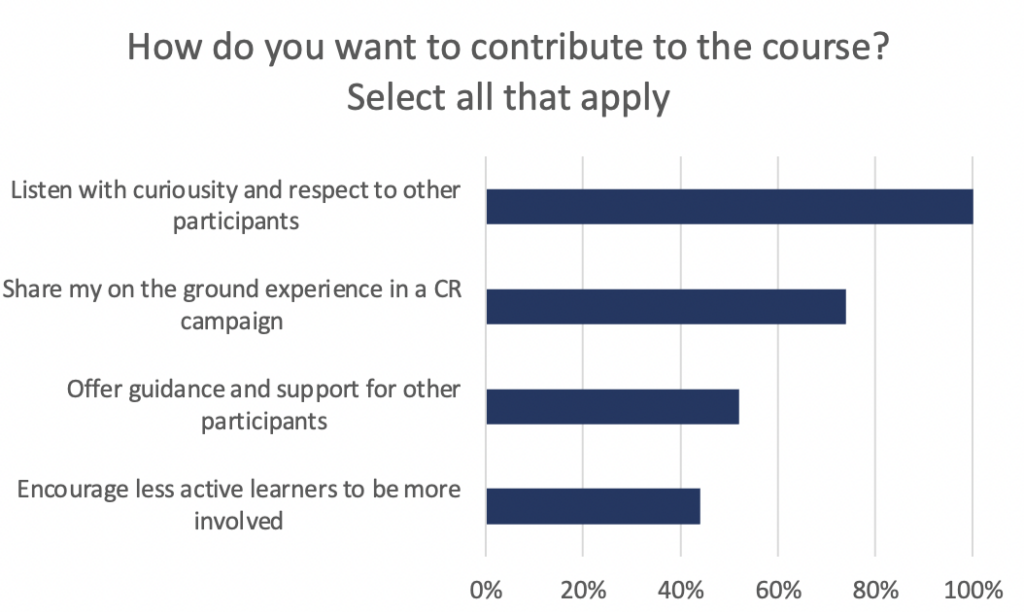
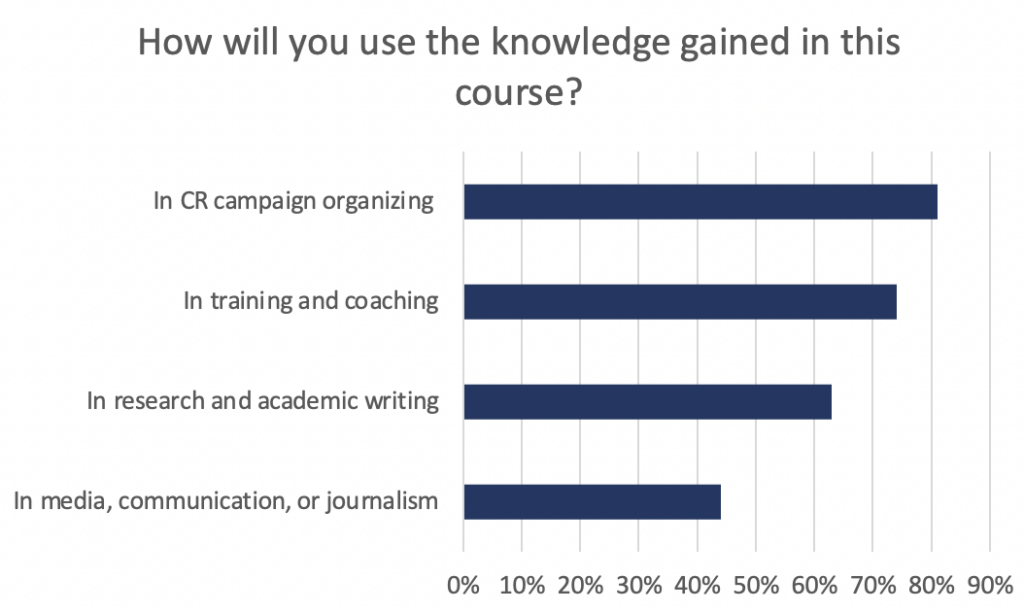
Course Content & Structure
Due the nature of the participant-led course, ICNC did not provide live moderation. However, ICNC staff provided:
- Comprehensive curriculum on civil resistance, meaningful videos and readings, discussion forums, group exercises, and resources for further learning
- Technical support
- Course announcements & updates
One of the unique features in the participant-led course was a self-learning community. Participants in the course built this community based on the following four principles:
- Active participation via careful content review & engagement in the forums and small group work
- Respect for different views and collaborative dialog
- Educating each other via constructive feedback, sharing relevant information, stories, and ideas
- Mutual assistance: checking on your colleagues that lag behind and are silent, offering help where needed
Course participants also had access to the ICNC Mobile App, which is available on iOS and Android. By using the app, participants could download the course content and access it offline when they were travelling or if they were in areas with low internet access.
Module 1. Introduction to the Course
In the welcome module, we laid out the objectives of the course. We discussed course activities, including forum posts, recorded webinars, readings, videos, webinar meetings and online discussions. We provided online learning tips to help participants make the most of the online learning experience. Finally, we introduced participants to the People Power Game: A Strategic Game About Civil Resistance, a video simulation that participants play throughout the course, during which the player takes on the role of a strategic planner for a nonviolent movement.
Module 2. Foundations of Civil Resistance
In this session we laid the theoretical groundwork out of which this field has grown, digging into both data and the big picture. Virtually every day, somewhere in the world, there are people engaging in civil resistance. But what do we mean by this term? Do we all understand it the same way? How is civil resistance defined and spoken about in participants’ towns, communities, regions or countries? In this session we clarified the concept of civil resistance, looking into power that underlies people’s actions and considering the track record of civil resistance over the past 110 years, including the reasons behind its effectiveness. This module aimed to equip participants with data to share with others in their networks about the effectiveness of civil resistance, and to enable them to articulate what civil resistance is in a clear and concise manner.
Module 3. Strategies and Tactics of Civil Resistance
In this session, participants looked at what strategy in civil resistance is, and how it relates to tactics. We examined examples of different tactics, including cultural resistance tactics, and discuss tactical innovation, including strategic sequencing of tactics that enhance the effectiveness of nonviolent methods and campaigns. Finally, we explored different conflict analysis tools that help movements systematically assess and analyze the battlefield in which they are engaging nonviolently.
Module 4. Repression, Backfire, and Defections
In this session, we started with a discussion about repressive contexts in which nonviolent resistance movements take place, and the phenomenon of backfire when violence against unarmed activists boomerangs back to those who carried out the repression. We explored how civil resistance movements can optimize the impact of backfire and use it to their advantage. How does the side that uses repression aim to hinder potential backfire? We then discussed defections that often, though not always, occur as a result of the backfire effect. This module focused on understanding defections from one group — security forces — and explores conditions under which the defections might happen. It also explored how regimes often try to mitigate the likelihood of security defections, and strategies that movements might deploy to increase chances of loyalty shifts among security forces.
Module 5. Small Group Project: Cases of Civil Resistance Around the World
This module was the group work module. Participants were given case studies all around the world with different goals, tactics, and strategies. Individually, and as a group, participants analyzed these civil resistance case studies and responded to hypothetical scenarios regarding key moments in the case study.
Module 6. Other Key Topics in Civil Resistance
In this session, we focused on a variety of important topics in the study and practice of civil resistance that have been selected for their emergence as key topics in the current field of study. By including such topics as challenging abuses by corporations, political democratization after civil resistance campaigns succeed against authoritarian rule, the role of faith communities in civil resistance, and the impacts of women’s leadership and participation in civil resistance campaigns, we aim to improve knowledge about these often lesser-recognized, yet incredibly important aspects of civil resistance.
Module 7. Finishing the Course
In the last two days of this online course we solicited participants’ views about the course and their learning experience. We asked about their learning progress, overall educational experience, assessment of the course content, interactions in the forums, and their personal engagement during the six-week period. This feedback has allowed us to improve our future online courses and make our teaching pedagogy on civil resistance more effective and more impactful on all learners involved.
Learning Gains Survey Results
Included below are the graphed responses to selected questions from the learning gains survey (conducted among the same group of participants that took both surveys) that demonstrate the extent of the knowledge gains from before and after the course.
The Pre-Course Learning Gains survey was completed by 20 participants and Post-Course Learning Gains survey by 20 participants. The comparative results from Pre and Post-Course surveys, included in the graphs below, are based on the responses of the 20 participants that filled out both surveys. You can use the links below to navigate directly to each graph. You can also view the full ICNC 2022 Participant-Led Learning Gains Report.
- How actively involved have you been in leading or planning a civil resistance campaign in the last 3 months?/After having completed the online course, how likely are you to become involved in leading or planning a civil resistance campaign?
- If you are currently participating in a civil resistance campaign, how effective do you think you are in achieving your campaign’s state objectives in your current training’s and actions?/After having completed the online course, how effective do you believe you will be in achieving the stated objectives of your civil resistance trainings or campaigns?
- How regularly does your campaign/movement hold internal teach-ins/workshops on civil resistance strategy and tactics?/After having completed the online course, how much more often are you to hold internal teach-ins/workshops on civil resistance strategy and tactics?
- On the scale below, select the number that best represents your current knowledge of civil resistance or nonviolent movements./On the scale below, select the number that best represents your current knowledge of civil resistance or nonviolent movements.
- How many civil resistance strategies and tactics do you know of?/How many civil resistance strategies and tactics do you know of?
- On the scale below, identify your comfort level in speaking to others about civil resistance or nonviolent movements./On the scale below, identify your comfort level in speaking to others about civil resistance or nonviolent movements.
Selected Graphs
3. How actively involved have you been in leading or planning a civil resistance campaign in the last 3 months?/After having completed the online course, how likely are you to become involved in leading or planning a civil resistance campaign?
Pre-Course Survey:
Before the course began, about 45% of respondents reported that they had not been (options 1, 2, and 3) actively involved in leading or planning a civil resistance campaign in the last 3 months.
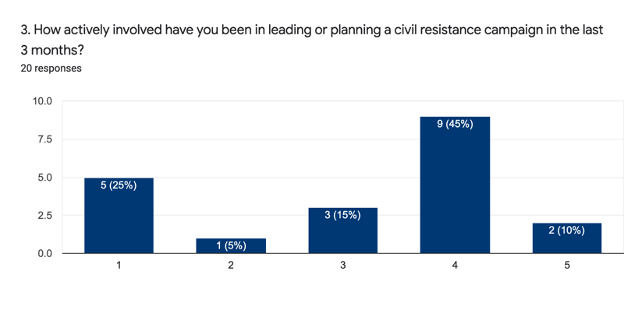
1= Not at all active; 5= Very active
Post-Course Survey:
Following the completion of the course, 90% of survey respondents reported that they are more likely to be active (options 4 and 5) in leading or planning a civil resistance campaign, showing that participants became more inclined to be involved in civil resistance campaigns during the course.
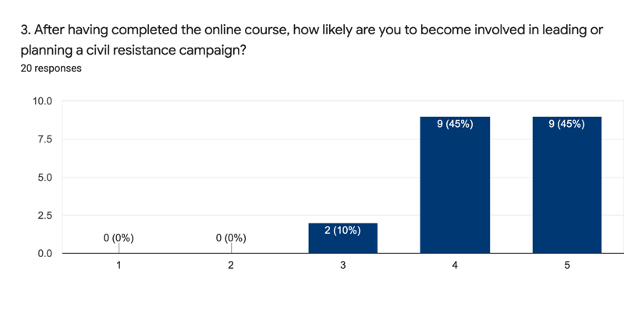
1= Not at all likely; 5= Very likely
6. If you are currently participating in a civil resistance campaign, how effective do you think you are in achieving your campaign’s state objectives in your current training’s and actions?/After having completed the online course, how effective do you believe you will be in achieving the stated objectives of your civil resistance trainings or campaigns?
Pre-Course Survey:
Before the course began, about 71% of respondents believed that they were not very effective (options 1, 2, and 3) in achieving their campaign’s stated objectives in their current training’s and actions.
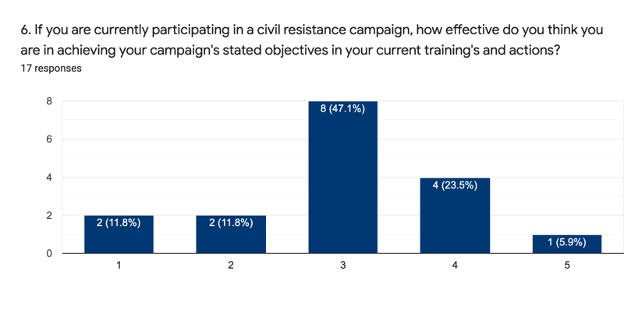
1= Not at all effective; 5= Very effective
Post-Course Survey:
Upon completion of the course, 80% of participants felt more effective (options 4 and 5) to achieve the stated objectives of their civil resistance trainings or campaigns. This shows that during the course, participants gained confidence in their abilities in achieving the goals of their civil resistance trainings or campaigns.
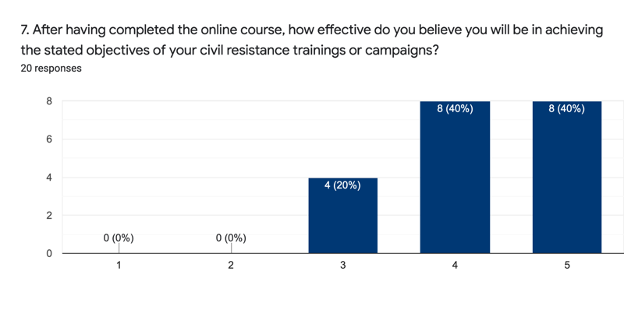
1= Not at all effective; 5= Very effective
10. How regularly does your campaign/movement hold internal teach-ins/workshops on civil resistance strategy and tactics?/After having completed the online course, how much more often are you to hold internal teach-ins/workshops on civil resistance strategy and tactics?
Pre-Course Survey:
Before the course, about 56% of respondents felt that they often did not hold (options not at all and rarely) internal teach-ins/workshops on civil resistance strategy and tactics.
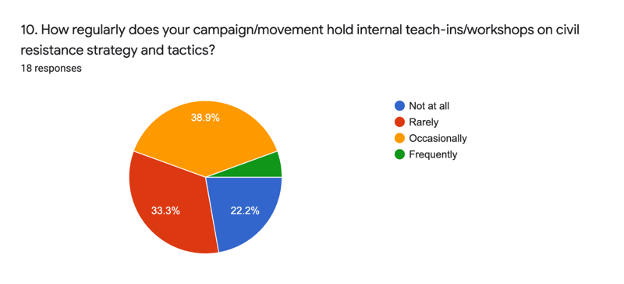
Post-Course Survey:
After completing the course, 90% of respondents believed that they were more likely (options occasionally and frequently) to hold internal teach-in/workshops on civil resistance strategy and tactics. During the course, participants became more inclined to trainings on civil resistance strategy and tactics.
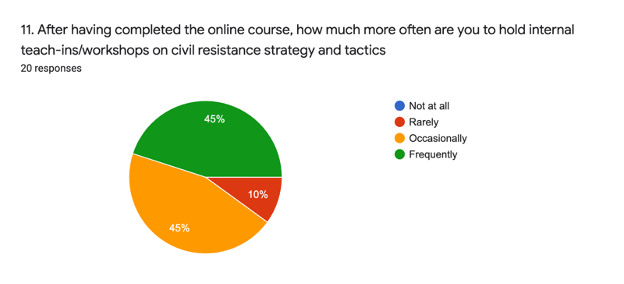
15. On the scale below, identify your comfort level in speaking to others about civil resistance or nonviolent movements./On the scale below, identify your comfort level in speaking to others about civil resistance or nonviolent movements.
Pre-Course Survey:
Before the course began, 50% of respondents reported that they did not (options 1, 2, and 3) feel knowledgable about civil resistance or nonviolent movements.
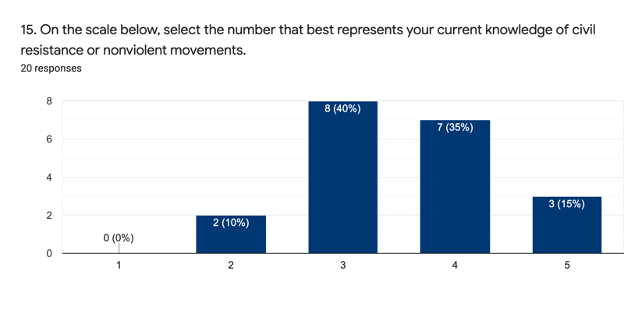
1= No knowledge; 5= A lot of knowledge
Post-Course Survey:
95% of respondents reported feeling more knowledgable (options 4 and 5) about civil resistance or nonviolent movements after completing the online course. This shows that during the course, participant’s gained more knowledge about civil resistance or nonviolent movements.
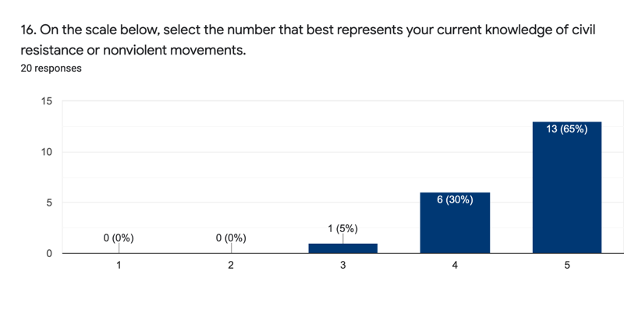
1= No knowledge at all; 5= A lot of knowledge
16. How many civil resistance strategies and tactics do you know of?/How many civil resistance strategies and tactics do you know of?
Pre-Course Survey:
Before completing the course, 85% of survey respondents reported knowing about 20 or fewer (options 0-10 and 11-20) civil resistance strategies and tactics.
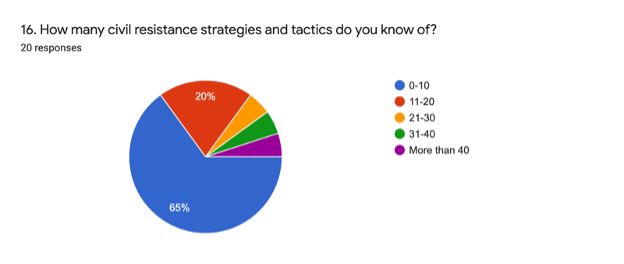
Post-Course Survey:
After completing the course, 50% of participants reported that they knew about 21 or more (options 21-30, 31-40, and more than 40) civil resistance strategies and tactics, showing that during the course, participant knowledge increased.
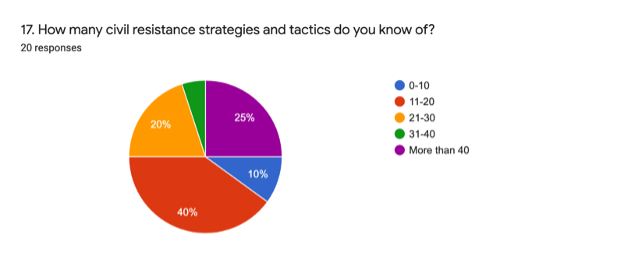
22. On the scale below, identify your comfort level in speaking to others about civil resistance or nonviolent movements./On the scale below, identify your comfort level in speaking to others about civil resistance or nonviolent movements.
Pre-Course Survey:
Before the course, 40% of respondents felt slightly uncomfortable (option 3) speaking to others about civil resistance or nonviolent movements.
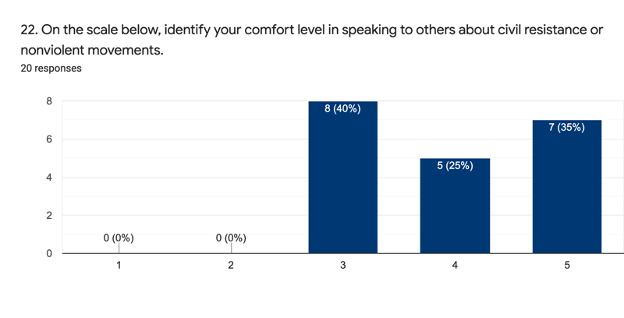
1= Not at all comfortable; 5= Very comfortable
Post-Course Survey:
After completing the course, 95% of respondents reported feeling comfortable or very comfortable (options 4 and 5) talking about civil resistance or nonviolent movements. This shows that during the course, participants became more confident talking about civil resistance or nonviolent movements.
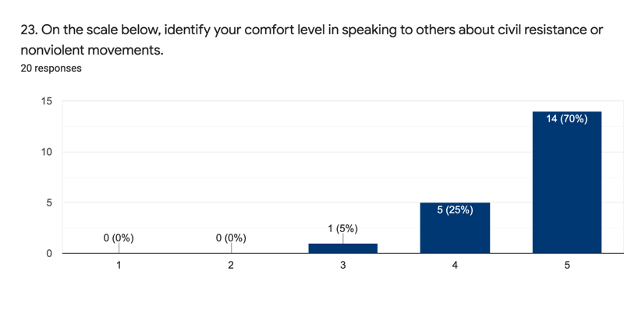
1= Not at all comfortable; 5= Very comfortable
Final Evaluation Results
The participant-led course also included a final course evaluation, in order for participants to provide feedback on the course content, self-learning community, course platform, and more.
As participation was disrupted by the onset of the coronavirus pandemic, 13 participants completed the final course evaluation. Click on the links below to see the selected graphs for each section.
I. Course Content
II. General Impression of the Course
III. Self-Learning Community
IV. Applicability
V. Self-Assessment
VI. Technology
Selected Graphs
1. How clear were the goals of the course and its modules?
100% of the respondents selected options 4 and 5, and no one selected 1, 2, and 3, showing that almost all of the respondents either agreed or strongly agreed that the goals of the course and its modules were clear.
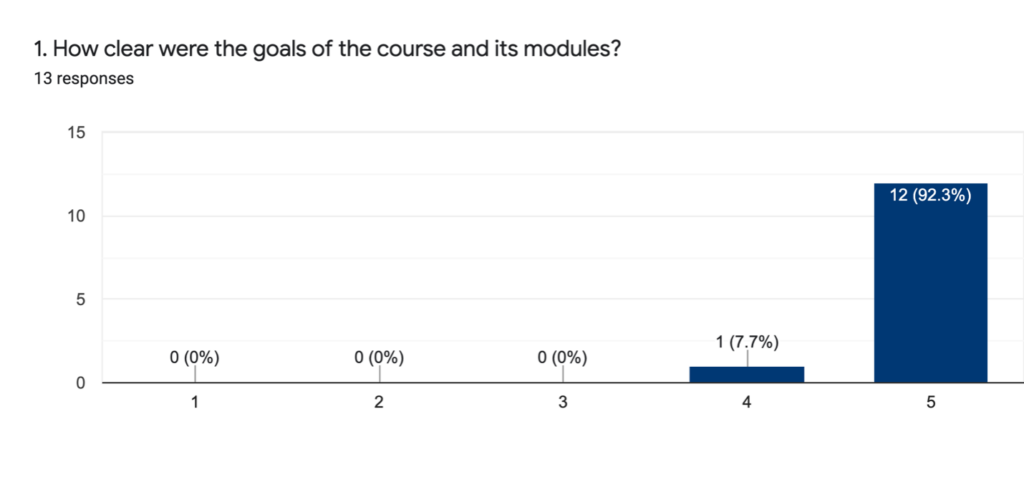
1= Not at all clear; 5= Very clear
3. How would you rate your overall experience with the course?
About 92% of respondents reported that they were satisfied (options 4 and 5)with their overall experience with the course.
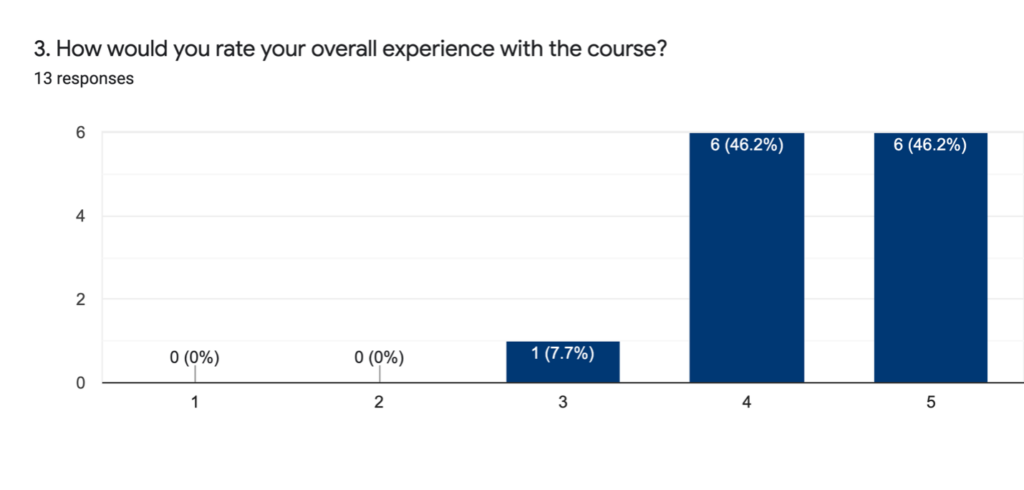
1= Unsatisfactory; 5= Excellent
II. General Impression of the Course
9. The course met my expectations.
All respondents reported that the course met their expectations (options 4 and 5).
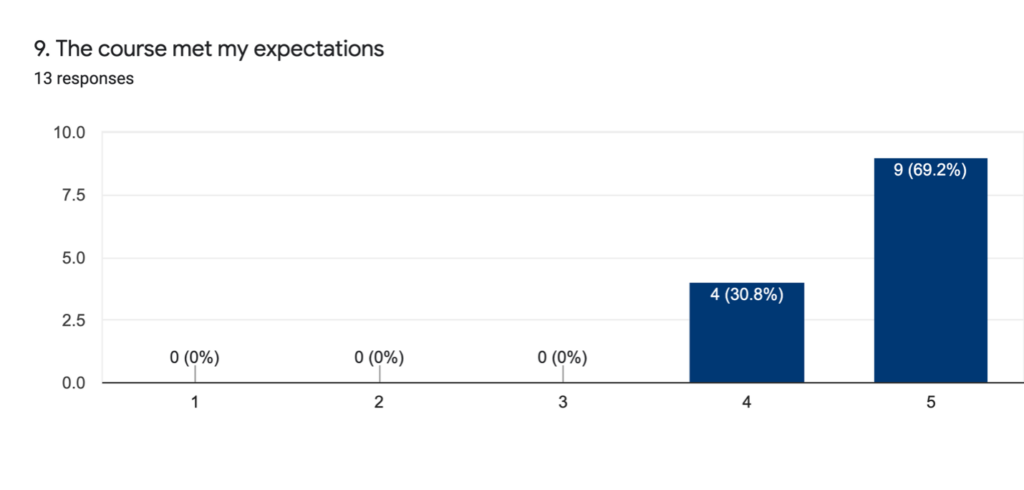
1= Did not meet expectations; 5= Exceeded expectations
10. I would recommend this course to other people.
100% of respondents selected options 4 and 5, and no one selected options 1, 2, and 3, showing that all respondents recommend the course to other people.
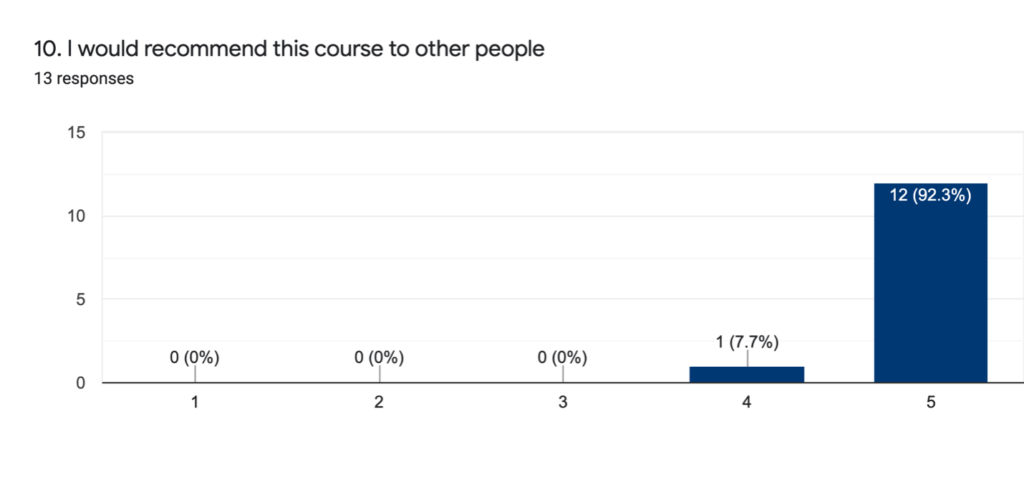
1= Would not recommend; 5= Highly recommend
11. I now have more knowledge about civil resistance and its various topics than I had before taking the course.
All respondents agree or strongly agree (options 4 and 5) that after taking the course, they now have more knowledge about civil resistance and its various topics.
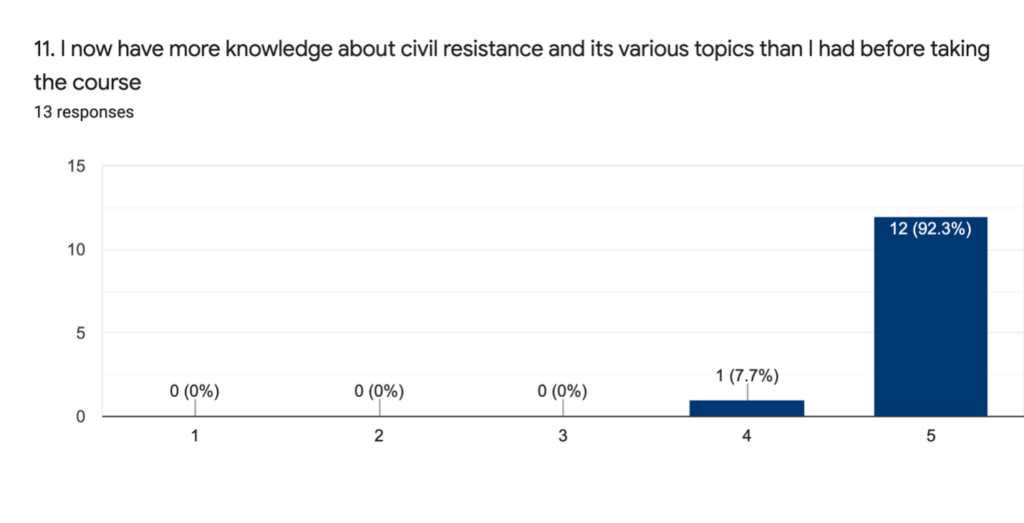
1= Disagree; 5= Strongly agree
17. Course participants offered comments that helped me in my learning.
About 85% of respondents agree or strongly agree (options 4 and 5) that fellow course participants helped them in their learning.
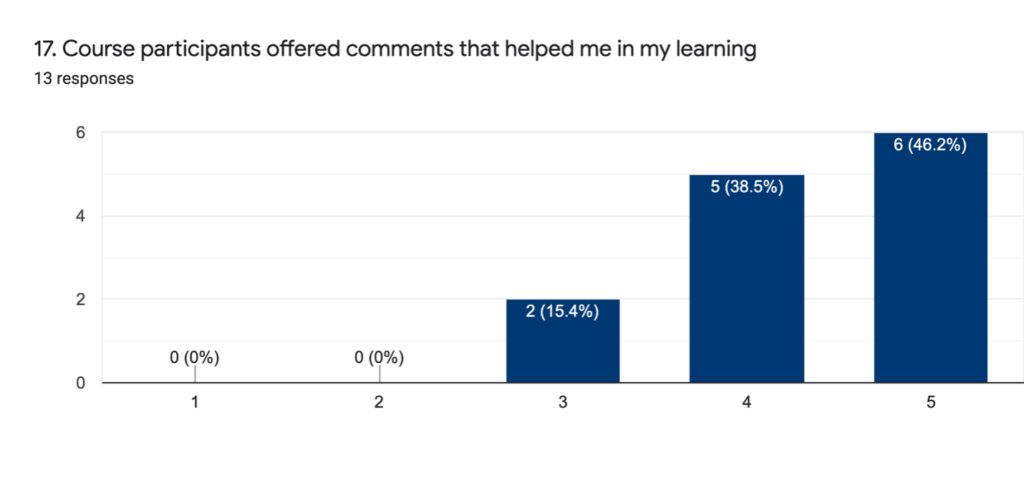
1= Disagree; 5= Strongly agree
20. Course content matched my interests and professional needs.
All survey respondents agree or strongly agree (options 4 and 5) that the course content matched their interests and professional needs.
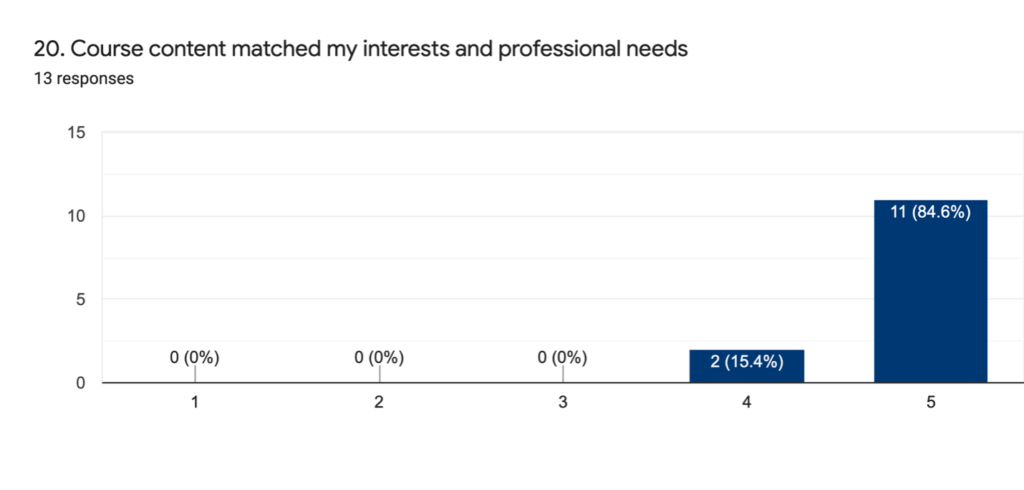
1= Disagree; 5= Strongly agree
23. How would you assess your own engagement with the course material, including participation in the course forums, on a scale from 1 to 5.
More than 69% of respondents reported that they were satisfied (options 4 and 5) with their engagement with the course material and in the course forums.
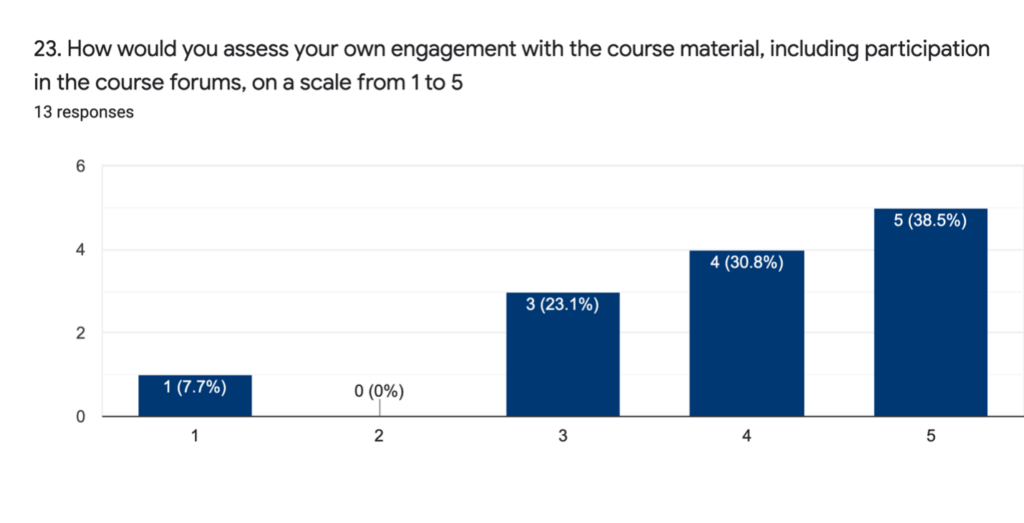
1= Unsatisfied; 5= Satisfied
25. Describe your online experience, including course technology and your interactions with fellow participants facilitate by that technology.
- Amazing.
- I thought that the online platform was clearly laid out and accessible. It was easy to navigate between modules and the sections within modules. I think the online forums were easy to use.
- The app did not function. this would surely have helped with time management for me.
- I had no issues. Whenever I asked the tech team they responded promptly and with clear and friendly answers.
- Throughout the course, I have been having internet challenges due to the remote community I work but in a whole, it has been great.
- With not much difficulty.
- My interactions haven’t been all that so smooth, as internet connectivity has been my main issue. it made it difficult to use the app on the phone and interact so well.
- Very good. I had good internet and my computer worked very well.
- I had an amazing online experience and I was able to learn more from other participants.
- I had difficulties with navigation through forums.
Tips for Future Participants
- Experience it as once-in lifetime opportunity like a study.
- I would advise that it is important to structure your day in order to allocate time to working through the course. I found using a notebook to jot down key points, issues, and reflections as well as plan for my forum responses was very useful and helped me manage my time also. I would also recommend allocating time to check back on forums to see if anyone has commented under your post(s) and whether new posts from other participants have been posted so that you can comment underneath and engage in discussions. On this, I would add that posting alone is not enough, you need to engage with posts from other participants and this should be kept in mind when planning your engagement with the course each week.
- Start each module as soon as they are accessible and not take for granted how much time you have to complete them. Treat this course as you would when doing a semester at a higher education institute. It has the amount of material to give you a complete understanding of the subject but it requires time to study it and respond to the questions.
- To schedule hours dedicated to the course.
- Make good use of your spare time, say reading the required readings when taking transportation. Draw linkage between the content of the course and the current situation you face, so as to keep your interest on the topics.
- Knowledge requires time and commitment, is what studying this course has thought me and i would love to share the same tip with future participants.
Selected Testimonials
- “This course is the best in the world on peaceful revolution.”
- “The course content is rich and encompassing, enough to make any participant an authority in the organisation and sustainability of a nonviolent civil resistance campaign. AA Victor.”
- “Before the course, I have been having a miniature idea about Civil resistance but the course has broaden my knowledge of which I am grateful.”
- “I would recommend the course to the people who are both new to civil resistance studies and those who have some knowledge in this and adjacent field of social sciences. As a political science student, I found the course both accessible and comprehensive, covering everything from the basics to the new frontiers of civil resistance research. I have also enjoyed discussing all of these topics with other participants in the discussion forums. The People Power game was another (somewhat addictive) delight. In sum, the course is suitable for both academics and practitioners and is flexible enough to adapt for different schedules and lifestyles. (I did not provide my full name due to potential security concerns).”
- “Although it has already been nearly a decade since my first participation in civil resistance, my understanding on “what civil resistance is” and imagination on “how it can be” have apparently been widened throughout the course.”
- “Civil resistance is a very powerful weapon that civilians can use to show and demonstrate there grievance against injustice, the more people posses this kind of knowledge, the more nations will leave in harmony. there will be enough democratic space for civilians to interact with their leaders, is very powerful and i wish nations and communities can adapt and give time for it.”
- “This is the best training i have attended so far. I thought i knew a lot about civil resistance until i came across the learning materials from this training. To be very honest, this training would have been worth any amount of money, if we were asked to pay for it. The youtube videos, manuals, articles, were simply the best! Thank you so much for this amazing opportunity.”
- “The only crash course on civil resistance, it is essential for everyone!”